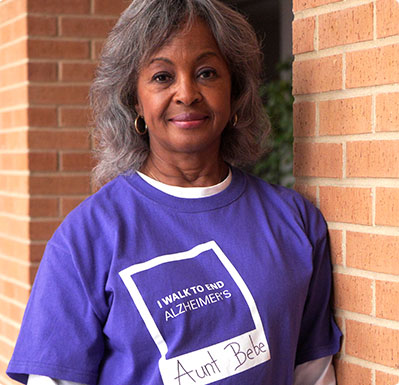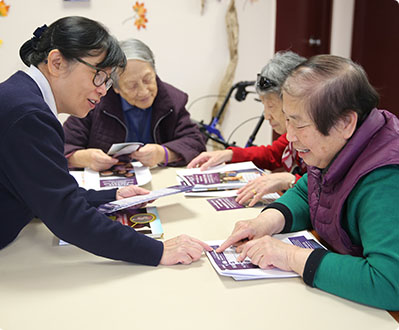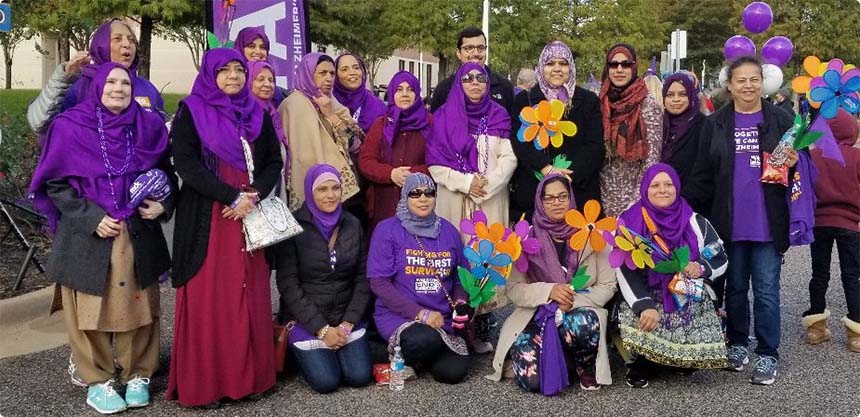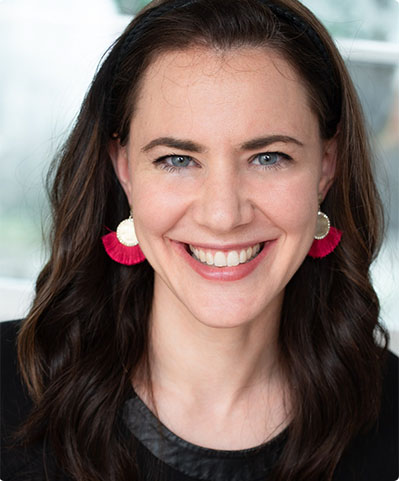
Double Your Impact for the Holidays
Double Your Impact for the Holidays
Your urgently needed year-end gift can go twice as far to provide care and support and accelerate Alzheimer's research this holiday season — and all year long. Show your giving spirit today during this 2x Match Challenge.
Donate NowDifferent Faiths, Same Fight
Communities of Faith Spread the Word About Dementia
Communities of faith spread the word about dementia
Dementia affects people of every race, ethnicity and religion. For many faith-based organizations, service to others is a cornerstone — which includes helping those facing Alzheimer’s.Increasingly, communities of faith are recognizing the impact of Alzheimer’s, and are working with the Alzheimer’s Association to raise awareness of the disease, provide access to care and support, and educate their members.
“Partnering with faith-based organizations is a deeply personal and effective way to connect with communities and meet people where they live, work, play and pray,” says Edie Yau, director of Diversity, Equity and Inclusion at the Alzheimer’s Association.
African Methodist Episcopal (AME) Church
Black people are about twice as likely as White people to develop Alzheimer’s — a devastating and alarming fact that the AME Church, a predominantly African American Methodist denomination, is currently working to address. For Roslyn Thibodeaux Goodall, an AME member and co-chair of the Alzheimer’s Association/AME Church National Partnership Steering Committee, dementia is personal: Eight members of her family have died from the disease. Goodall began raising awareness of Alzheimer’s within African American communities and helping recruit Black clinical trial participants more than 15 years ago.
For Roslyn Thibodeaux Goodall, an AME member and co-chair of the Alzheimer’s Association/AME Church National Partnership Steering Committee, dementia is personal: Eight members of her family have died from the disease. Goodall began raising awareness of Alzheimer’s within African American communities and helping recruit Black clinical trial participants more than 15 years ago.“This is my personal ministry,” she says.
In 2019, AME and the Alzheimer’s Association announced a nationwide partnership to create greater awareness of the resources and services the Association provides to families, while engaging church members in volunteer opportunities. With more than 2 million church members in the United States, the potential reach is monumental.
Empowered by the partnership with the Association, Goodall served as chairperson for a nationwide AME Connectional Purple Sunday event, highlighting caregiver stories, disease information and Association resources.
“I wanted people to be able to come together and see others who had the same or similar experiences and feel safe talking about their journey,” Goodall says. “Especially in the Black community, we’re private with our personal business. I hope events like this encourage people to have the conversation about Alzheimer’s out loud — that it’s not taboo.”
More than 400 church members tuned in live for Purple Sunday, which was held online in March 2021 due to the COVID-19 pandemic. Thousands more accessed a recording of the event afterward.
Volunteer in the fight against Alzheimer's
The Alzheimer's Association has numerous opportunities for volunteers to provide vital support for people living with the disease and their families.
Buddhist Tzu Chi Foundation
Asian Americans and Pacific Islanders (AAPI) are the fastest growing racial or ethnic group in the United States, and the AAPI older adult population is expected to increase 145% between 2010 and 2030. Since age is the greatest risk factor for Alzheimer’s and other dementias, AAPI older adults are facing a public health crisis.In Asian communities, stigma around the disease remains rampant. “It’s a cultural thing,” says Han Huang, Tzu Chi USA executive vice president and former CEO. “Families tend to hide when they’re facing a hardship. We want to help change that mindset because it’s detrimental for both the caregivers and the person living with the disease. Awareness is the first step.”
 Tzu Chi — an international humanitarian organization founded on Buddhist principles, including compassion — works to alleviate the suffering of those in need and create a better world for all. By partnering with Alzheimer’s Association chapters across the country, Tzu Chi volunteers help bridge cultural and linguistic barriers to facilitate the delivery of Association information and resources to Chinese-speaking communities.
Tzu Chi — an international humanitarian organization founded on Buddhist principles, including compassion — works to alleviate the suffering of those in need and create a better world for all. By partnering with Alzheimer’s Association chapters across the country, Tzu Chi volunteers help bridge cultural and linguistic barriers to facilitate the delivery of Association information and resources to Chinese-speaking communities.Huang says the collaboration is akin to a tree. “The Association is the center, the trunk. But it has to have branches that extend and reach further,” Huang says. “Tzu Chi has the influence in the Chinese community that is needed to be those branches.”
Dozens of Tzu Chi volunteers across the country are training to deliver Association education programs in Chinese. Huang hopes this approach can extend the partnership’s sphere of influence and impact. “We are a grassroots organization. We know how powerful word of mouth can be,” he says.
Islamic Circle of North America (ICNA)
One of ICNA’s core principles is to strengthen the bond of humanity by serving all those in need anywhere in world. When Surryea Syed, the Houston representative for ICNA’s “Why Islam” division, discovered the Alzheimer’s Association online in 2016, she was inspired to connect ICNA volunteers with those facing the disease.Syed organized visits to nursing homes across the country, focusing on those that included memory care units, and arranged to have flowers and other small gifts brought to the communities.
“From our visits, we realized how much help is still needed for the cause, how devastating the disease is,” she says. “Islam teaches us to work for the community, and we knew we needed to help educate people about the disease and explain why we should all care about it.”

Part of ICNA’s community work includes presenting local educational seminars. With help from the Association, they’ve added information about Alzheimer’s to their outreach. Syed also formed a Walk to End Alzheimer’s® team in Houston to bring awareness to the Muslim community, ultimately inspiring over 700 fellow ICNA members nationwide to participate in their local Walks and raise money for Alzheimer’s care, support and research.
United Orthodox Synagogues (UOS)
Like many faith communities, UOS in Houston sought ways to connect its congregation during the COVID-19 pandemic’s unprecedented time of isolation. To continue their Jewish commitment to “tzedakah,” or charity, and show support for members facing compounded dementia-related difficulties during lockdown, the community organized an Alzheimer’s awareness and caregiver appreciation event.
 Ruthie Schulman, UOS director of Education and Engagement, worked with the Alzheimer’s Association to organize a unique two-day program. The weekend included a walk through a local neighborhood as part of the 2020 Walk to End Alzheimer’s; a special virtual ceremony that highlighted the stories of caregivers and people living with the disease; and the sharing of Association resources, including support groups.
Ruthie Schulman, UOS director of Education and Engagement, worked with the Alzheimer’s Association to organize a unique two-day program. The weekend included a walk through a local neighborhood as part of the 2020 Walk to End Alzheimer’s; a special virtual ceremony that highlighted the stories of caregivers and people living with the disease; and the sharing of Association resources, including support groups.“We wanted to make sure that our congregation members felt seen,” says Rabbi Barry Gelman, who led the UOS congregation in the event. “Caring for loved ones with Alzheimer’s or dementia is a whole new level of difficult, and we wanted them to know we stand by them.”
